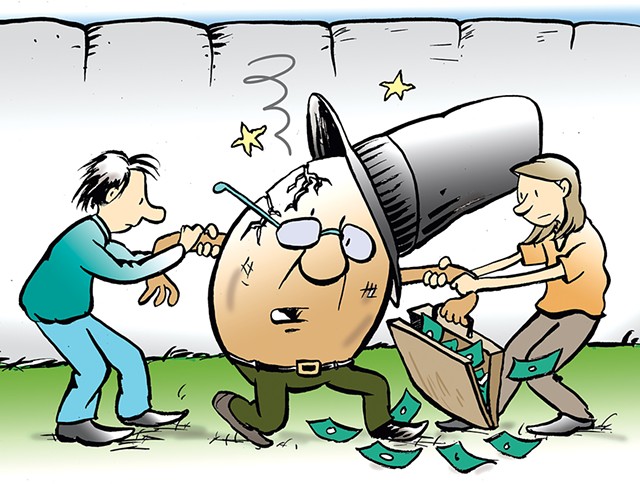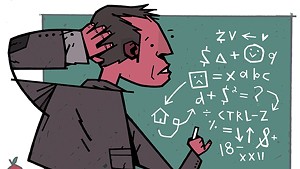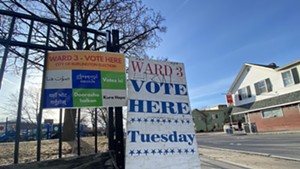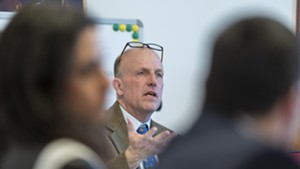
- Tim Newcomb
Members of the Montpelier Roxbury Public Schools board gathered last week to figure out how to handle the latest twist in the most challenging budget season in recent memory.
"We've got some urgent decisions to make as a school board tonight," superintendent Libby Bonesteel told virtual attendees and the smattering of residents sitting in the Montpelier High School library. "And I want to stress: This decision needs to be made tonight."
In a sign of just how high the stakes were, four of Montpelier's five state representatives — Sen. Ann Cummings (D-Washington), Sen. Andrew Perchlik (D/P-Washington), Sen. Anne Watson (D/P-Washington) and Rep. Conor Casey (D-Montpelier) — were in attendance.
On the agenda: coping with a forecasted property tax increase that could top 20 percent in the coming year. While inflation and employee health care costs are partly to blame, a change that legislators made to Vermont's byzantine state education funding formula also contributed to the potential tax hikes.
Now lawmakers are scrambling to make a fix. A bill wending its way through the Statehouse would alter an education funding law known as Act 127 and give school districts the opportunity to push budget and other school-related votes to April 15, weeks after Town Meeting Day on March 5.
"This has been pure, absolute, complete chaos," Montpelier Roxbury board member Kristen Getler remarked about the curveballs school districts have faced this budget season.
Across Vermont, school officials are discussing whether to revisit proposed budgets in light of legislative efforts to address the tax hikes. Some districts will vote as planned. Others say they're in a holding pattern until the proposal to change Act 127 actually becomes law, which legislators hope will happen in a matter of weeks.
Most Montpelier Roxbury board members agreed that they'd spent months crafting a fiscally responsible spending plan that met students' needs.
"We don't have frilly things that we can take out of our budget," school board member Jill Remick said. "I'd rather we try to hang on for this year ... and then very strategically look at our overall long-term plan for our district."
The legislature's "fix" is likely to actually raise taxes even more for Montpelier and Roxbury homeowners, according to the school district's initial calculations. Still, board members decided to stay the course and have voters decide the fate of the spending proposal on Town Meeting Day.
In Vermont, once voters approve local budgets, the state sends districts money to cover costs from a single pot of cash, the education fund. Several factors outside of districts' control ultimately determine local property tax rates. One of those is a district's number of "weighted" pupils.
Students are given "weights" based on how costly they are to educate. Low-income and rural pupils, as well as English language learners, are weighted more heavily. Act 127, a 2022 law that is just going into effect, increased the weights for those students in an effort to provide districts the needed funding to better serve them.
The change meant districts with lower pupil weights could expect their homestead property taxes to go up, even if they didn't increase their spending. To blunt the hike, lawmakers created a "transition mechanism" in Act 127. It capped property tax hikes at 5 percent for districts that didn't increase year-over-year spending by more than 10 percent per pupil.
Across Vermont, cash-strapped districts used the opportunity to add millions of dollars to budgets, planning to sock away money for long-delayed capital improvements. Those decisions, on top of much higher education spending overall, led to big tax hikes throughout the state — even in districts that Act 127 was intended to benefit.
Lawmakers say they didn't see this coming.
Last week, legislators in the House Ways and Means Committee came up with an Act 127 tweak that they think could ease some of the pain. H.850 would repeal the 5 percent cap on property tax hikes for wealthier districts and replace it with something dubbed the "cents discount," or a five-year property tax break seen as a better, simpler way to soften the tax increase shock: The lower a district's budget, the lower the tax rate.
"Is it perfect? I don't know," said Heather Bushey, finance director for the Essex Westford School District. But it's "bringing back that linear relationship between spending and the tax rate I think is hugely important."
Why didn't lawmakers foresee the consequences of Act 127 when they adopted the bill? They studied in excruciating detail how to update the system of weights to better reflect the true costs of educating kids in poverty, in rural districts and with limited English proficiency. A special committee met off-session to study the issue. But estimates of exactly what the new formulas and caps could mean for school spending and property taxes were hard to come by.
Sen. Ruth Hardy (D-Addison) warned her colleagues that there were so many variables in the state's complex school funding formula that how the weights affected district spending and tax increases was anyone's guess.
"Things are going to change," she said on the Senate floor in March 2022. "This is just for modeling purposes only and is just an estimate. So don't take it to the bank."
The legislature's analysts, in the nonpartisan Joint Fiscal Office, told lawmakers that they could predict which districts would benefit — and which wouldn't — from the new formulas. But estimating the actual tax impact was beyond them.
In a May 2022 note on the bill, senior analyst Julia Richter cited only one concrete financial impact, saying the bill would require $605,000 from the state for various expenses. All the note says about other costs is that the bill "would have an unclear fiscal impact to the Education Fund in future years."
"Total education spending is determined by local votes. It is possible this spending could increase. Districts ... may increase education spending as a result," she wrote in May 2022.
Catherine Benham, chief fiscal officer, declined to comment.
"JFO doesn't like to get into conjecture," Rep. Scott Beck (R-St. Johnsbury) said.
Others warned of the risk of further burdening taxpayers. The Vermont League of Cities & Towns supported the effort to revamp the pupil weights to improve equity but also worried that there "seems to be no cost control" in the bill.
At the time, however, there was little indication of the spending pressures ahead, Rep. Peter Conlon (D-Cornwall) said during testimony last week. He noted that school budgets were going up by about 3 percent, and "it looked like health care was under control."
"That was definitely not good prognostication," he said.
Rep. Brian Minier (D-South Burlington), who sits on the House Education Committee, said he worried that "a lot of fingers are being pointed" at the new weights as driving the spending increase when other factors are also at play. Voters may shoot down school budgets and blame lawmakers for failing to address the problem in time.
"I am just concerned that this is both going to discredit us when our fix doesn't do enough and discredit the change in weights, too," he said.
House Ways and Means Committee chair Rep. Emilie Kornheiser (D-Brattleboro) acknowledged the caps didn't work as projected, apologized for the disruption the bill caused districts and expressed optimism that the new transition mechanism would help.
Asked by colleagues how the situation could have been avoided, she offered several answers. For one, she said lawmakers need to listen more closely to the guidance given by the Joint Fiscal Office, particularly the warnings that their estimates are based on "all other things being equal."
"I think we really want to think that we can know the future, and we can't," she said.
There is also only so much lawmakers can do as a part-time legislature, Kornheiser said. The Vermont General Assembly is typically in session from January to mid-May.
"I think we saw this coming in September, but there was nothing we could do, really," she told colleagues.
That explanation didn't sit well with Rep. Jay Hooper (D-Randolph Center).
"That's bullshit," Hooper told Seven Days.
There is plenty the legislature could have done to fix the problem, but no one was looking out for the impact on taxpayers, he said.
Heidi Scheuermann, who served Stowe as a Republican representative through 2022, lambasted her former colleagues on social media. "Pathetic! Indefensible! Dishonest! Pitiful!" Scheuermann wrote on X (formerly known as Twitter). Lawmakers who passed Act 127 "didn't care about the consequence," which, she added, "any idiot could have seen."
Scheuermann was one of just 11 lawmakers who voted against the bill. She said that while people think of Stowe as wealthy and able to handle any tax increases, working-class families who have been there for generations are at real risk of being priced out.
The school district that includes Stowe, Lamoille South Supervisory Union, is on track for a big hit. Superintendent Ryan Heraty said the town could face a 40 percent increase in property taxes if cuts aren't made or lawmakers don't intervene. The board held an emergency meeting on Monday, where they decided to delay the vote and look for cuts.
"This is a slow-moving train wreck that we've seen coming for six months," Heraty said.
Even the proposed fix isn't a cure-all, something legislators have acknowledged.
In joint testimony last Thursday, Vermont Superintendents Association president Amy Minor and Vermont School Boards Association president Flor Diaz Smith asked lawmakers to find additional tax revenues to offset property tax increases. And they urged legislators to provide clear and timely information to make the rollout as smooth as possible, suggesting that this last-minute change could erode voter trust.
The House bill, H.850, would provide $500,000 to pay for the cost of new elections for districts that postpone votes. It also would require clerks to automatically mail new absentee ballots to those who requested one for Town Meeting Day. The full House is expected to vote on the measure this week, after which the Senate will need to sign off.
Even with the Act 127 "fix," the budget snafu has clearly unsettled Vermonters, some of whom are now directing their ire at lawmakers.
At an Essex Westford school board meeting last week, Essex Junction resident Alison Wermer told members that the projected tax rate increase was not sustainable for young families or retired people. That district has not yet approved a final budget; it's one of a small number of Vermont towns that routinely vote on school-related matters in April. But even with the "cents discount," administrators said last week, taxes are projected to go up 17 to 22 percent under the current spending proposal.
"I came here tonight ... to say that when I vote no for the school budget, it is not so much to be negative about your efforts," Wermer said, "but to send a message to the legislature that the direction we're going in has to change."
Correction, February 15, 2024: Due to an editing error, a previous version of this story misreported that Bushey testified to lawmakers.














Comments
Comments are closed.
From 2014-2020, Seven Days allowed readers to comment on all stories posted on our website. While we've appreciated the suggestions and insights, right now Seven Days is prioritizing our core mission — producing high-quality, responsible local journalism — over moderating online debates between readers.
To criticize, correct or praise our reporting, please send us a letter to the editor or send us a tip. We’ll check it out and report the results.
Online comments may return when we have better tech tools for managing them. Thanks for reading.